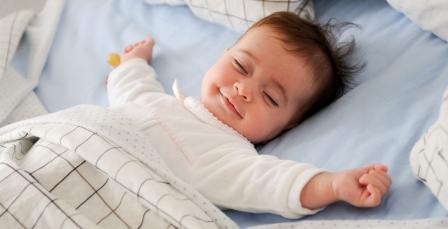A night of healthy and comfortable sleep requires tons of stuff such as a good recommended mattress, comfy pillow and blanket, quiet environment, and a suitable temperature.
Your bedroom temperature can make an immense difference in your sleeping quality. According to research, room temperatures are considered one of the most important aspects required for achieving good sleep.
Most people feel uncomfortable and sweaty in hot temperatures and aren’t even able to sleep. A study indicates that most people experience abnormal sleeping patterns in hot summer months and face difficulty in sleeping quarters at optimal temperature.
Due to which people often struggle with the query what is the best temperature for sleeping? If you have this doubt as well, then no worries.
In this article, I’m going to mention the best sleeping temperature for adults and babies, along with specifying several tips to keep your room cool.
Best Temperature To Sleep For Adults

A temperature of 65°F (18.3 degrees Celsius) is considered the best for sleeping. However, it might vary in a few degrees as per a person’s individual preference.
But most doctors keep the thermostat set around 60 to 67°F, which is (15.5 to 19.4 degrees) to get the most comfortable sleep.
This temperature is recognized as the most suitable for sleeping due to its ability to relate to your body’s internal temperature regulation. After 24 hour period, the body’s internal temperature witnesses a shift called a circadian rhythm.
Our body is programmed to witness a change or a dip in the core temperature during the evening time. Turning the thermostat down at night may assist in temperature regulation and indicate to your body that it’s for sleep.
During the time for your bed, your body begins to shed warmth, and it continues until it reaches its low point near the daybreak, which is around 5 a.m. The body then cools by increasing the blood vessels in your skin.
During the nighttime, when the temperature starts to fall, you might feel your feet and hands get a bit warmer. This warmness takes place your body starts to let the heat escape through the body to decrease your core temperature.
If the temperature around you is either too cold or hot, it might affect the drop in internal temperature of your body and can result in disrupted sleep.
Best Sleep Temperature For Babies

You are not really required to make massive changes in terms of temperature for babies as babies usually benefit from a room temperature that is one or two degrees warmer up to 68°F.
Bodies of babies are small and still at a developing stage, due to which they are more sensitive to the changes in ambient temperature.
However, you need to make sure the temperature isn’t too warm for babies as it can enhance the chances of sudden infant death syndrome.
Therefore, it is recommended to have a favourable temperature by setting a thermostat, using approved and comfortable sleepwear, and not using any heavy blankets.
You should always check your baby’s temperature by touching the back of their neck or stomach at night. According to research, babies usually achieved temperature maturation on average of eleven weeks of age.
They start to have a minimum core body temperature of around 97.5°F within four hours of their bedtime, quite the same as adults.
So, if you witness the baby’s temperature too hot or sweaty, you can remove the clothing layer, and yet if you notice them being hot, you should consult a doctor. For a healthy sleep, babies should sleep in a quiet and dark environment.
Tips To Prevent Your Room From Overheating
Now that we know how much overheating can be bad for babies and why we should avoid too hot a temperature.
Let’s look into several techniques that can help you keep your bedroom cool and prevent the issue of overheating.
Here are beneficial tips that can help keep your room cool:
- Cover your blinds during the day to reduce the heat build-up in the bedroom.
- Use air conditioners or fans during hot climates to avoid the room from getting too hot.
- Open the windows during the evening to allow ventilation in your room.
- Use good quality breathable mattress, duvet, pillow, sheets, comforter, and wear loose PJ’s at night to decrease sweating issues.
- You should have a warm bath or shower around one or two hours before going to sleep, as it can encourage an excellent effect.
Apart from these, sleep hygiene habits like avoiding caffeine, alcohol, stretching before bedtime, sleeping at a regular time every night, and a quiet bedroom can help you get a more peaceful sleep by setting your body clock with a consistent schedule.
Circadian rhythm is also quite sensitive to fluctuations in diet, exercise, lighting, and the timing you perform these activities as it can impact your body temperature and might even affect your sleep.
So you must follow a good schedule to keep your sleeping habits checked.
FAQs
1. What is considered too cold for sleeping?
A temperature below 50 °F can be too cold for sleeping. As too much, cold temperature can make you sleep under several layers of blanks, which might raise your core temperature and leads you to sweat. This can also disturb your sleeping cycle.
2. Does the temperature occurring outside affect the human body temperature?
Yes, a body can react to external or outside temperature efficiently. So, when the temperature outside rises, your body temperature might also witness a rise. Due to which it is essential to set the room temperature every night accordingly.
3. Is a temperature of 75 degrees too hot?
Yes, a temperature of 75 degrees can be too hot to sleep. This can make you sweat all night and make your feel uncomfortable. The best temperature to sleep in at night is 60 to 67°F.
You May Also Like To Read:
How Your Mattress Could Negatively Affect Your Sleep?
Which Type Of Mattress Is Good For Your Health?
The Best Spring Mattress In India
Conclusion
Healthy and uninterrupted sleep requires several measures such as comfortable attire, mattress, pillow, and temperature. A proper temperature in your room can help you feel comfy and make your body relax.
Here we have mentioned the appropriate temperature for sleeping, whether it’s an adult or a baby. Also, we have explained things that one can do to prevent their room from overheating.
If you have any doubts regarding the sleeping environment and temperature then, tell us in the comments.


